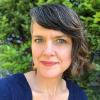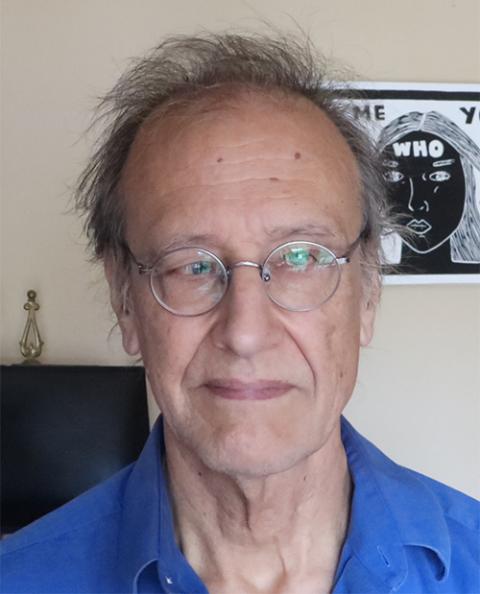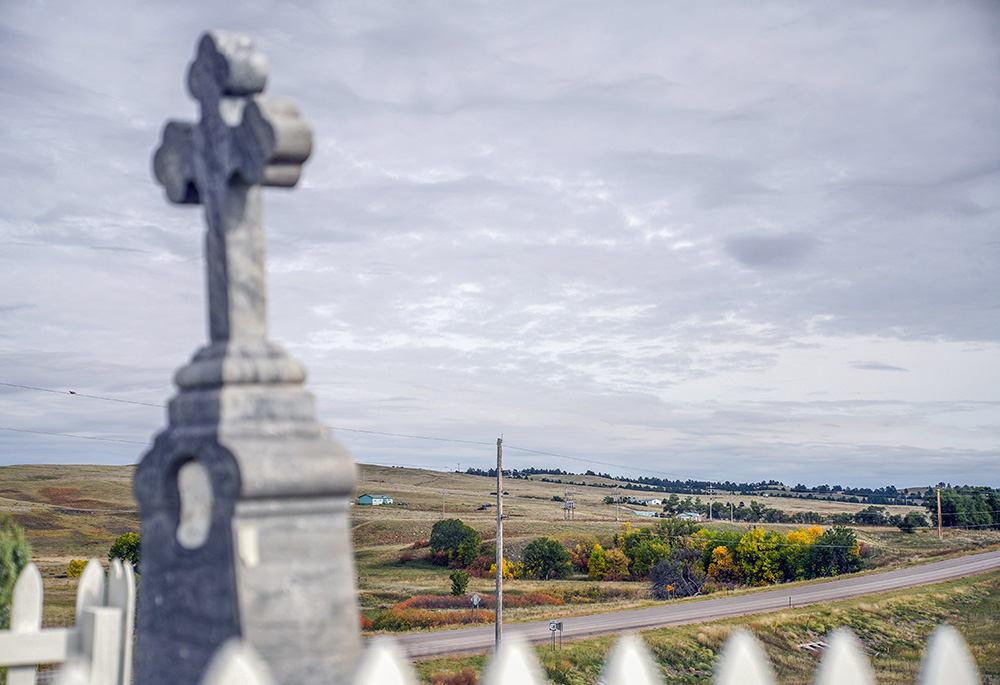
Pine Ridge Indian Reservation is seen from the burial place of 19th-century Chief Red Cloud Sept. 30, 2021, in Pine Ridge, South Dakota. Red Cloud defended against U.S. land grabs as long as he could but converted to Catholicism and invited the Jesuits to start Holy Rosary Mission after he and his people were confined to Pine Ridge. (AP/Emily Leshner)
"A deep sadness."
That was the first emotion Jay, a member of the Gros Ventre Tribe, said he felt as he read an apology issued by the U.S. bishops for the Catholic Church's mistreatment of Indigenous people.
Jay attended the now-closed St. Paul Mission Grade School on the Fort Belknap Reservation in Montana, where he says he was sexually abused by a religious sister, often in front of a statue of Jesus, and by a priest in a remote location in the mountains. He was 11 years old.
"I thought of those small little children, younger than me, at boarding schools miles from home," said the 70-year-old, whose nickname is being used to protect his privacy. "It's an awful thing."
His own horrors have not left his head or heart, he said. "I will never really get away from them. Not until I die."
Jay was among a number of Indigenous individuals, including survivors and tribal leaders, who spoke with NCR after the bishops issued a document acknowledging, in a circumscribed manner, the Catholic Church's culpability, especially through church-run boarding schools, in the intergenerational trauma of Indigenous people.
Reactions shared were diverse, with some calling the bishops' acknowledgement meaningful progress and others questioning if it can, in fact, be viewed as an apology. Most welcomed the effort while highlighting shortcomings, notably its silence on the documented sexual abuse of children at church-run schools.
The most significant traumas endured by Native communities were epidemics, national policies and Native boarding schools, which "often led to broken homes harmed by addiction, domestic abuse, abandonment, and neglect," states the bishops' document. "The Church recognizes that it has played a part in traumas experienced by Native children."
Advertisement
Ruth Anna Buffalo, board president of the National Native American Boarding School Healing Coalition, a group formed a decade ago to advocate on behalf of survivors and their descendants, told NCR it was the first formal apology from the U.S. bishops and an important step toward healing and accountability.
"It recognizes the trauma inflicted upon our communities and the pain and suffering of Indigenous people due to the church's actions and neglect," Buffalo said. "But it does not specifically mention the sexual abuse of children or those taken, those stolen, from families and never returned."
The apology is part of a broad, 56-page guidance on the pastoral care of Indigenous people. "Keeping Christ's Sacred Promise: A Pastoral Framework for Indigenous Ministry" was approved June 14 by the U.S. bishops during their meeting in Louisville, Kentucky. The last such framework was written more than 45 years ago.
"Sadly, many Indigenous Catholics have felt a sense of abandonment in their relationship with Church leaders due to a lack of understanding of their unique cultural needs," reads the new document. "We apologize for the failure to nurture, strengthen, honor, recognize, and appreciate those entrusted to our pastoral care."
The document also calls for an international conference to study the history and consequences of the "Doctrine of Discovery" — a set of 15th-century papal bulls, or decrees, that legitimized colonial exploitation of Native lands — because of its "profound impact on the lives of Indigenous populations."
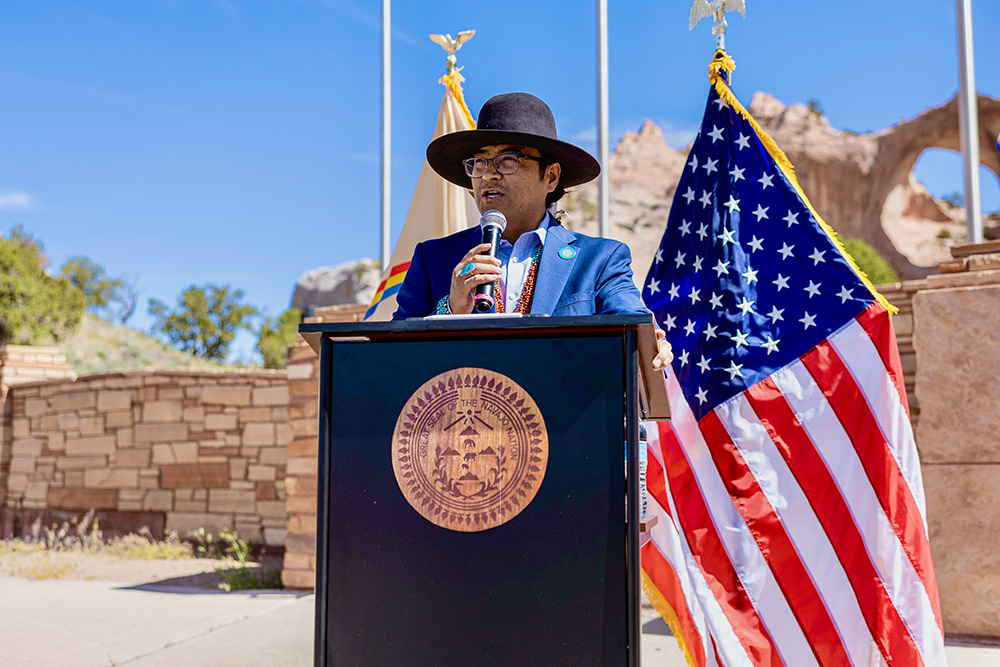
Navajo Nation President Buu Nygren speaks at the Navajo Nation Veterans Memorial Park in Window Rock, Arizona, where he signed legislation approving a water rights settlement for the Colorado River this May. "This apology by the Catholic bishops is welcomed, although sad," said Nygren. "It is sad to think that the people our grandparents, great-grandparents and the people who came before them placed their trust in left them with lifelong scars. We now know that trauma is generational." (Courtesy of the Navajo Nation)
Navajo Nation President Buu Nygren, in a statement emailed to NCR, said he was grateful to live in a time when the wrongs perpetrated on Native children are "now being reported and acknowledged."
"The bishops' apology, though welcome, rekindles the memories of the trauma experienced by so many of our grandparents and parents who remember their abuse," said Nygren, who heads the country's largest Native tribe. "They won't ever forget what children should never know."
In the 18th and 19th centuries, according to the bishops' document, Catholic religious communities or church entities operated 84 of the more than 500 boarding schools for Native children, where the intent was, in the words of a Civil War veteran who founded one of the boarding schools, to "kill the Indian, save the man."
Children were removed, sometimes forcefully, from their families, and experienced an unrelenting stripping away of culture, religion and family bonds.
Linc Kesler, who established the First Nations and Indigenous studies program at the University of British Columbia and spent time teaching at the University of Oregon, recounted his mother's memories on the Pine Ridge Indian Reservation in South Dakota, where Holy Rosary boarding school was located.
"She told me how my grandmother would sometimes literally have a tug of war with the priests who would roll up to the house and wanted to take the kids," Kesler said.
Removing Native children sometimes forcefully from their homes was government policy, "but it was also church complicity and, in a certain sense, it was undoubtedly thought of as a form of evangelization, for the children's good," said Kesler.
Young children didn't have a choice to leave their families or to embrace the faith, he said. "Is that evangelization? Is it conquest? Is it child abuse? I think there are a range of interpretations."
Conditions at the schools varied, and some former students recall positive experiences. Yet the system itself "left a legacy of community and individual trauma that broke down family and support systems among Indigenous communities," the bishops' document states.
Scholars have mapped out how dozens of priests credibly accused of abuse spent time on tribal land, and a recent Washington Post investigation determined sexual abuse of Indigenous children was widespread at 22 Catholic-run boarding schools in the United States.
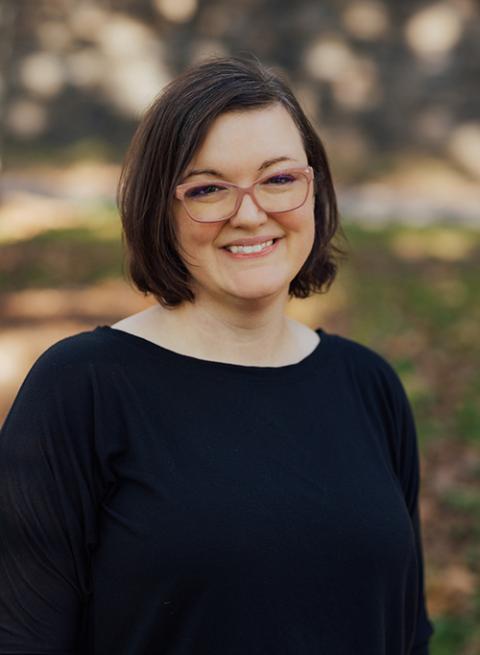
Elisha Chi is a registered descendant of the Bering Straits Native Corporation and a postdoctoral fellow at the University of California, Santa Barbara. (Courtesy of Elisha Chi)
Elisha Chi is a registered descendent of the Bering Straits Native Corporation and a postdoctoral fellow at the University of California, Santa Barbara. Chi's family members are boarding school survivors, and she advocates for the return of Native lands.
She said that the bishops' new document is foremost focused on pastoral care and evangelization and that the portions that include expressions of regret are, as an apology, “abysmal." And to not state clearly in an apology that sexual abuse occurred at church-run schools is “a horrendous omission," said Chi.
Maka Black Elk is a citizen of the Oglala Lakota Nation and the previous executive director of the truth and healing process for the former Holy Rosary School, now called "Mahpíya Lúta," the Lakota term for Red Cloud, on the Pine Ridge reservation.
Black Elk was part of multiple conversations that contributed to the bishops' document, and he told NCR the prelates worked with many Indigenous Catholics "to try to find the right words and the right message to center on."
"Much of what these pages offer is the product of dialogues with Native Peoples and of our collective discernment regarding their pastoral needs and the actions needed to address them," reads the guidance.
Black Elk thinks the criticisms that the document does not acknowledge sexual abuse are "definitely valid."
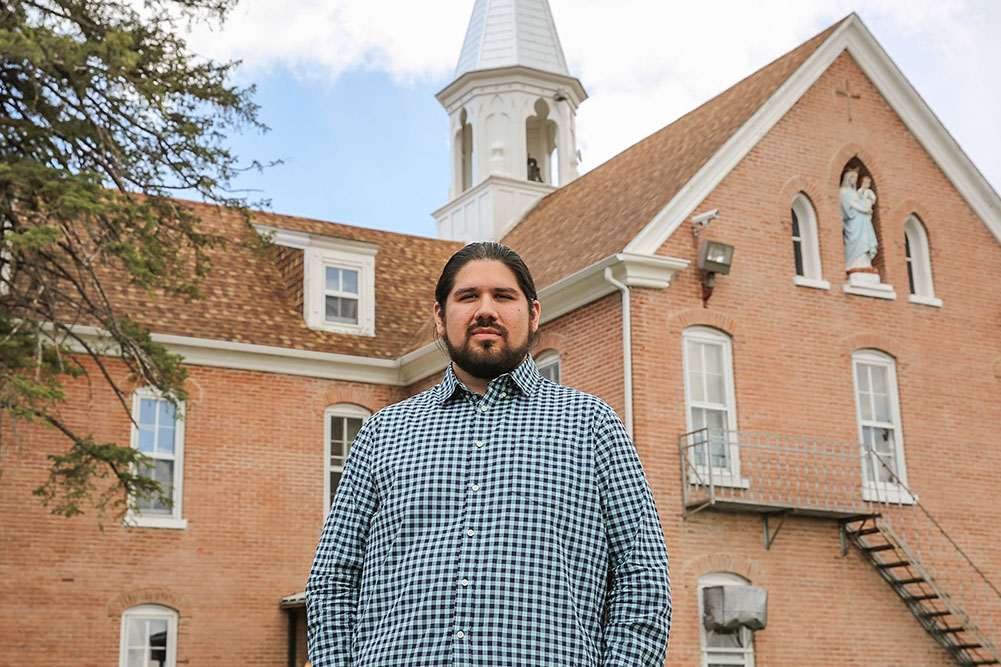
Maka Black Elk, a citizen of the Oglala Lakota Nation, is the previous executive director of the truth and healing process for the former Holy Rosary School, now "Mahpíya Lúta," on the Pine Ridge Indian Reservation in South Dakota. (CNS/Courtesy of Red Cloud Indian School/Marcus Fast Wolf)
"I don't believe it is any person's intentions to dismiss the sexual abuse, which has been well-documented," he said. Still, the bishops' intent "would have been better served" if they had acknowledged the abuse specifically.
The need to address "reconciliation regarding the boarding school period" was one of several issues that came up during the U.S. bishops' listening session with Catholic Indigenous leaders in 2019, bishops' conference spokesperson Chieko Noguchi told NCR. Since then, she said, an apology and a promise of outreach has been part of the plan and has remained in one form or another in document drafts.
Interior Secretary Deb Haaland, a Laguna Pueblo and a Catholic, in 2021 commissioned a review of boarding school policies supported by the federal government. The U.S. Conference of Catholic Bishops at the time offered to assist the investigation where it could.
According to the U.S. Department of the Interior report, released in 2022, at least 500 Alaska Native, American Indian and Native Hawaiian children died at the schools.
Noguchi said the new pastoral framework is the beginning of the process "to learn more about how the church can better serve Native and Indigenous communities."
"The apology issued is a starting place for the challenging work of walking with the impacted communities on their path towards healing and reconciliation," she said.
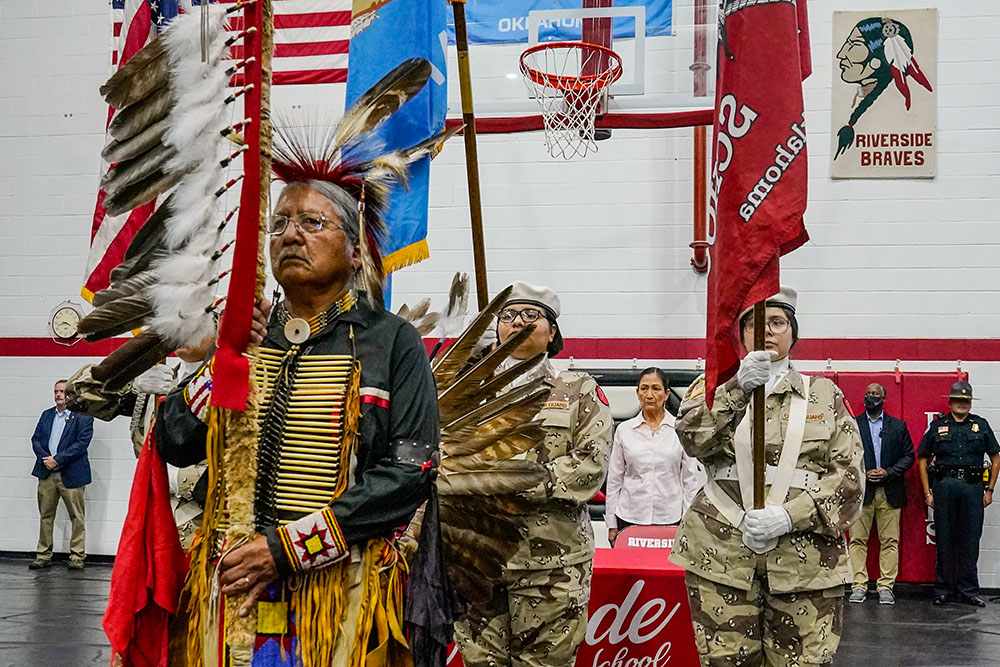
James Nells, of the Navaho Tribe, and a teacher at Riverside Indian School, leads the Riverside Indian School color guard during opening ceremonies July 9, 2022, in Anadarko, Oklahoma, for a meeting to allow U.S. Secretary of the Interior Deb Haaland, rear, to hear about the painful experiences of Native Americans who were sent to government-backed boarding schools designed to strip them of their cultural identities. (AP/Sue Ogrocki, File)
Black Elk said he has long reflected upon the complexities of apologies.
"Healing doesn't happen in big documents published by the U.S. Conference of Catholic Bishops or when Pope Francis comes to issue an apology," he said.
In 2022, the pope visited Canada to offer a historic apology for the church's "catastrophic" involvement in the "cultural destruction" of Indigenous people though the country's residential school system.
Official apologies like the pope's are important, he said, "yet I've learned in all my years working in South Dakota that healing happens with clergy on the ground, on reservations, among Indigenous people."
"It happens as people muddle through the slog and pain of this difficult history and experience of being an Indigenous person and a Catholic today," said Black Elk.
Bev Sellars is a former chief of the Xat'sull (Soda Creek) First Nation who attended a residential school in British Columbia established by the Missionary Oblates of Mary Immaculate. Sellars wet her bed as an emotional response to the trauma of separation and abuse. "So I got the strap," she recalled.
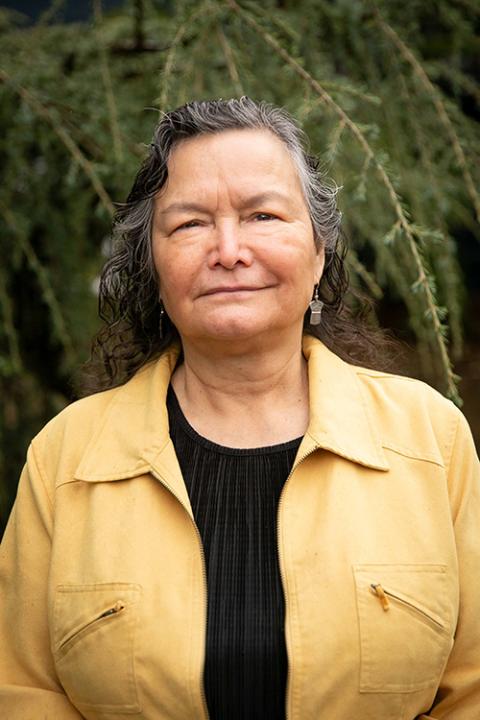
Bev Sellars, a former chief of the Xat'sull (Soda Creek) First Nation in Canada, was abused at an Oblate-run Catholic school as a young girl. (Courtesy of Bev Sellars)
Discussions around the need to heal always "speak about the healing Indigenous communities have to do," said Sellars. She thinks the Catholic Church must focus on its own healing — "in part by more fully acknowledging their genocidal activities and the damage they've done."
Black Elk said one of the detriments of colonization is that it left Indigenous peoples with a sense of "having to choose between tradition and modernity, Indigenous identity and non-Indigenous identity, Western culture and Indigenous culture."
He said it may be harder to heal from that tension than the bishops acknowledge in the document, but he said he's grateful there's a recognition of this tension and that the bishops affirm "that it's not true, or that if the church did believe it in the past, it doesn't believe it anymore."
"Some believe an irreconcilable chasm exists between traditional Indigenous culture and Catholicism," reads the document. "For Native Catholics who feel this tension, we assure you, as the Catholic bishops of the United States, that you do not have to be one or the other. You are both."
In Montana, Jay said he thinks the apology is both good and deficient.
"I think it will help with healing, but not that much," he said, adding he wishes the bishops had noted with more detail the suffering of Native children, how they had their long hair cut and trampled upon, their mouth washed out with soap for speaking a Native language and how, for some, their lives were forever transformed by sexual abuse.
